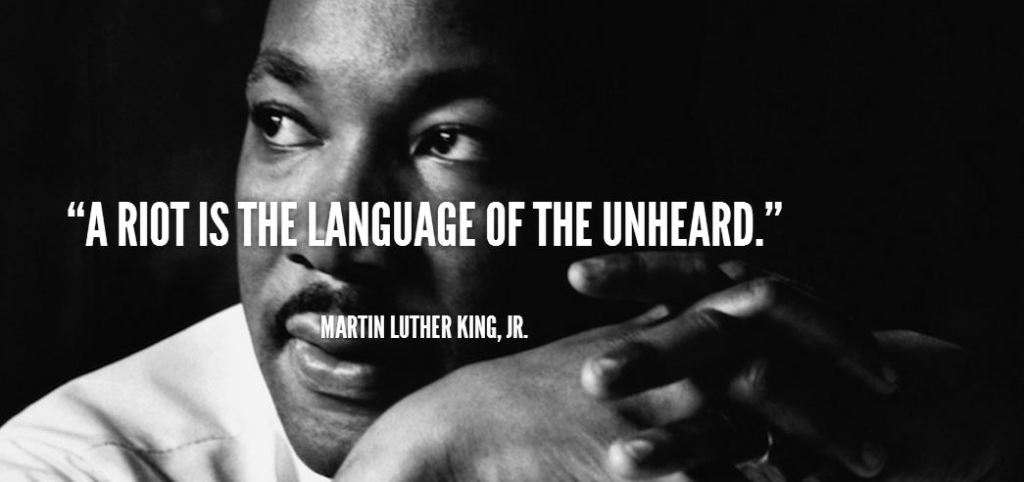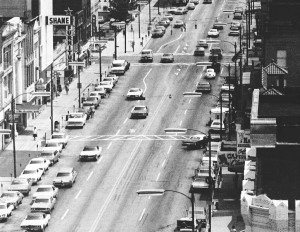For the past couple of weeks, I’ve been posting quite often about the non-indictment of Darren Wilson and the related protests in Ferguson. Tamir Rice, the 12 year old quickly gunned down by Cleveland Police off-roading through a park because of an airsoft gun, has made some appearances as well. Throughout these social media discussions, there have been some common threads of resistance to the resistance that seem to be permeating the overall culture, and it’s high time we discuss some of them.
First, it needs to be clarified that I’m a white guy. If you want to know the truth, the pain, the goals, and the motivations behind the Ferguson resistance, I’ll redirect you to people of color who have been on the ground in the neighborhood, such as DeRay McKesson and Johnetta Elzie, who’ve been organizing, and Bassem Masri, who has been reporting as a citizen journalist between getting his phone stolen and being locked up as the police attempt to suppress his message. I stand in solidarity, but this movement belongs to them. Today, I simply hope to kill some of the overdone and invalid talking points that have been used to stall the movement.

“Tearing apart your community isn’t going to help anything at all”
Let’s start with a list:
- The damage and looting involved perhaps thirty people out of thousands
- Nearly all of it happened on the first night on a very small stretch of one road
- Protesters have been visible on livestreams cleaning up and guarding shops
- 200 cities have joined the movement peacefully and no looting has been reported
Now that you’re thoroughly wrong, I’ll add a few more coals to the fire. First, there have been several instances of white folks tearing their communities apart and they weren’t even protesting a hardship. Nobody came down so hard on these guys, or these ones, or these ones, or these ones, or these ones…
“Martin Luther King would be so ashamed of what is happening”
You’re damn straight he’d be ashamed at the treatment of blacks in Ferguson at the hands of the police, but that’s not the asinine point you’re trying to make. You’re still on the offensive against riots and civil disobedience. How painful it must be to realize that not only is MLK explicitly well-known for acts of civil disobedience, he also had a deep understanding of property damage as an attack on the system:
“This bloodlust interpretation ignores one of the most striking features of the city riots. Violent they certainly were. But the violence, to a startling degree, was focused against property rather than against people. There were very few cases of injury to persons, and the vast majority of the rioters were not involved at all in attacking people…
I am aware that there are many who wince at a distinction between property and persons—who hold both sacrosanct. My views are not so rigid. A life is sacred. Property is intended to serve life, and no matter how much we surround it with rights and respect, it has no personal being. It is part of the earth man walks on; it is not man…
Why were they so violent with property then? Because property represents the white power structure, which they were attacking and trying to destroy.”
If you need a TL;DR, here’s one last MLK quote: “A riot is the language of the unheard.”
“Michael Brown was a thug. Tamir Rice was a thug. Everyone I don’t like is a thug!”
Please tell me more about the crimes they committed which warranted the death penalty without a trial, or how the firing of a gun was the only option at the disposal of the officers involved.
And once you have that figured out, do the same for Eric Garner and Akai Gurley.
I have hundreds more when you finish those, but you won’t. You’re using the word “thug” because you learned to stop using the N-word in public. Stop it.
“This one time, a white guy got shot by police and nobody protests that.”
Then do it. Here you go, I’ll even give you an anchor case. Just be aware, though, that many of the demands of those protesting (uniform cameras, citizen councils, better training, more accountability) would help white victims as well as black victims, so really, you could just support the movement that is already nationwide.
“What we really need to talk about is black on black crime.”
You know the difference between a crime committed by a black man and a crime committed by a police officer? The black man goes to jail and the police officer gets a paid vacation. And the police officer’s actions were sanctioned by the state that gave him a badge and a weapon. And white police officers kill black men twenty-one times as often as white men. Let that sink in for a moment.
And by the way? Black on black crime has been dropping sharply for the last twenty-plus years.
“Walking around yelling and holding signs doesn’t accomplish anything.”
Yeah, you have a great point. Caged and neutered protests do not shock the system. They are controlled; they are out of sight and out of mind. That’s why we need to disrupt, the way protests always were before we became so complacent. If you haven’t noticed, we’re not just staying on the sidewalk anymore.
“Blocking traffic is obnoxious and interferes with people who have jobs.”
MLK. Rosa Parks. Harriet Tubman. Eugene V. Debs. Susan B. Anthony, etc.
I mean, come on… the Boston Tea Party? The end of the Vietnam War debacle?
This country has a rich history of civil disobedience, and that disruption is your call to action. We disrupt because if we don’t, the system ignores us. Blocking streets, staging sit-ins at government offices and places of business, strikes (general and targeted), and other nonviolent protests are specifically designed to interfere. It is nonviolent, does not damage property, and yet still allows us to shock the system and make demands.
If you don’t want riots, and you know caged protests don’t work, it’s time to stop complaining about the middle option. We have a sign for you if you’d like to join us. The sooner we have justice, the sooner the roads are clear.
“Well, maybe you have a point, but you need to stop making it about race.”
On the one hand, I strongly believe anyone who says this knows, deep down, that they’re full of shit. It would take an exceptionally thick skull in this country to not understand the effects of privilege, even if it makes some folks uncomfortable. So let me unequivocally say yes, it is absolutely about race.
On the other hand, a society that applies social justice equally across all races is good for everyone. A society in which the police view black men as equal human beings is one in which we can all have the opportunity to thrive on a level playing field. So, instead of screaming how it’s not about race, how about you fight alongside us for social justice for black men at the hands of police and when we get there, we can talk about your cause. You’d be surprised how many friends you can make when you focus on solidarity first.

